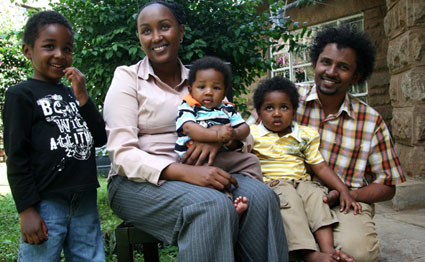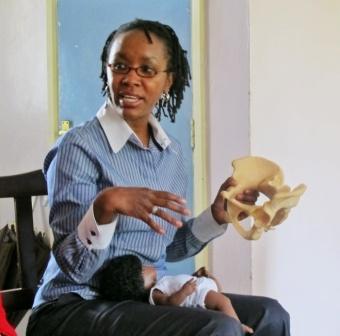Would you consider a home birth? As in choosing to give birth at home instead of in a hospital? And not that you do not have the money to deliver in a hospital, actually you can easily pay for the bill but you just want to deliver in the comfort of your own home?
Well, last week on Friday, I met one mom – Carrie Ndoka, a mother of three boys who has delivered her two children at home with the assistance of a midwife. I had so many questions for Carrie because I have never before met a woman who made the decision to deliver at home –not by circumstance, but by choice. I must have asked her about a million questions, but she remained calm through it all as she explained her reasons why. She stands by her choices despite the strong backlash she has received and continues to receive from many quarters.
Interesting.
Well, after my interview with her I had so much to write but I had to summarize it into this article. You can also read it below.
“Despite the government’s call for women to deliver in health facilities to reduce the risks associated with childbirth, a high number of Kenyan women still continue to deliver at home.
The latest Kenya Demographic and Health Survey (KDHS) 2008/9 indicates that 56 per cent of births in Kenya take place at home, with women in rural areas, those with low levels of education and low income forming the majority.
It is, therefore, interesting to learn that there are well-educated, urban women who can easily afford the luxuries of a birth in the remodelled maternity wings of private hospitals, who are choosing to give birth at home.
In private hospitals, these women have access to the latest technological equipment, with consultant gynaecologists, anaesthetists and paediatricians at hand to receive their babies.
But while they can effortlessly pay for the cosy amenities in these hospitals, they are instead choosing to have their babies at home.
Why is this so?
Thirty six-year-old Carrie Ndoka is a communications consultant with a foreign-based donor organisation in Nairobi. This mother of three delivered two of her children at home, the first child being delivered in hospital by “default”.
“My husband and I were all set to deliver our first son here in our house, all by ourselves. After regularly attending all my antenatal clinics, we also attended private birth classes, which gave us the confidence that we could birth our own baby at home,” she says.
However, when labour continued for too long, the couple decided to go to hospital, where she delivered their son shortly thereafter. Carrie’s reason for attempting a home birth for her first delivery was simple:
“Pregnancy and birth are not diseases that need medical or hospital intervention, unless when absolutely necessary,” she says.
Carrie, an International Business Administration graduate from USIU, and who is currently studying for a degree in development studies, says she prefers home births because of the peace and comfort her house offers her, something she believes she would not get in a hospital.
“Hospitals have this aura that makes me uncomfortable and tense. But at home, I am in familiar territory, with no restrictions.
I can cook, walk freely and hang out with my family as labour progresses, perhaps even watch a movie with them.
I also like home births because I don’t have to listen to the screams from the stranger in the next bed, allowing me to concentrate on my own labour without distraction,” she says.

Greatest discomfort
One of Carrie’s greatest discomforts about a hospital birth is that the woman is unlikely to be in control of the process, since it will be dictated by the medics around her.
“A woman in labour should be able to be in tune with her body and listen to it guide her. As long as she has full confidence in her body’s ability to birth naturally, she will not need any drugs or surgical procedures, unless absolutely necessary,” she says.
This is the strong conviction she had when she went into labour with her first son.
But things did not go as planned, and aware of the potential risks, she decided to go to hospital.
But according to Carrie, her fears about a hospital birth were only reaffirmed after her hospital birth.
“When the midwives examined me, they said I was 9cm dilated and told me to relax, that my baby would be out in no time. However, all this changed when the doctor arrived soon after. He mentioned he needed to travel out of town immediately, and induced me.
This hastened my contractions, and a few minutes later, my son Taj was born,” she remembers.
Being a first time mother, Carrie says she felt intimidated by the doctor.

“My labour was progressing well under the guidance of the midwives, but when he walked in, everything changed.
The midwives had no voice and had to obediently follow the doctor’s instructions. I too did not question him,” she says, adding that she does not believe the induction was necessary.
Her unpleasant hospital experience did not end there.
“After every few minutes, someone kept coming to my room to check on me. I had no privacy. While I appreciated their care and concern, I felt that the checks were too many, some unnecessary.
My worst experience came early one morning when a strange man walked into my room, came straight up to me, undid my gown and shamelessly shoved his hands into my bosom without saying a word.
Furious, I asked him who he was. He replied that he was a doctor, and that he was checking if my breasts were producing milk.
That was it. I asked for an immediate discharge from the hospital.”
And with that, Carrie reaffirmed her decisionnever to deliver in a hospital again, at least not if she could avoid it.
When she got pregnant again three years later, she decided to engage an experienced midwife for her home birth.
“As usual, I attended all my regular antenatal clinics at a private hospital. I had no complications whatsoever, and at 36 weeks, my gynaecologist gave me the go-ahead to deliver at home with the assistance of a midwife, if that was what I wanted.
This was after he had verified the qualifications of the midwife,” she says.
Carrie chose Lucy Muchiri to help her. Together, they drew up a birth plan, which included regular monitoring and checks, and what to do in case of an emergency during labour and birth. Interestingly, the determined Carrie even chose to have a water birth!
And when her labour began, she went through the first stages with her husband.
He helped her with the breathing, massaged her back, as well as helped her walk around. However, she was regularly on the phone with the midwife, and as the labour progressed into its last stages, Lucy joined her at 2am.
Three hours later, Carrie was holding her second son, Rio, 3.1kgs, having delivered him in a mobile birth pool, in her bedroom.
Her husband, Maina Maseeti, cut Rio’s umblical cord.
Carrie, who delivered at 42 weeks, has no doubt that had she gone to hospital, she would have been induced, perhaps even had a caesarean section recommended because she was way past her expected due date.
Her third child, Uba, who weighed 3.6kgs, was also delivered at home.
Don’t the risks of a home birth bother her?
“There is no guaranteed outcome in any birth, whether at home or in hospital. However, I believe in having a natural birth in a relaxed, comfortable environment, and in this case, my own home. I also prefer home births because my pregnancies have always been smooth and low-risk. If I had experienced even the slightest complication during pregnancy, I would have had a hospital delivery. Or if I had any concern during labour just like I did with my first birth, I would have gone to hospital.”
Besides, Carrie adds that the midwife always comes fully equipped with a birth kit containing all the requirements for an emergency, either on the part of the mother or the child before they get to a hospital.
“I live very close to a number of 24-hour private hospitals, so it is possible to be in one of them in just under five minutes, since I always have a vehicle on standby,” she says.
So what do her friends think of her decision to give birth at home?
“Most of them think I’m crazy,” she laughs.
“I have even had friends offer to contribute towards my medical bill, assuming that I am broke; I have received plenty of criticism, but it does not faze me,” she says.
Carrie decries the naivety of many pregnant women who deliver in hospitals, saying that some doctors are deceitful when it comes to maternity services.
“Many women place too much trust in their doctors, but unfortunately, most of this trust is misplaced.
If the doctor says the pelvis is small, the baby is too big, the baby is not positioned well, the baby’s heartbeat is irregular, or labour is progressing too slowly and recommends an induction or emergency caesarean section, we immediately accept it as true because we trust the doctor, and also because we are afraid to question his authority lest he get offended,” she says.
Carrie believes that inductions and caesarean sections are unnecessary in many cases.
“Some doctors are driven by selfish interests, for instance when they need to rush elsewhere, and feel that the woman’s labour will delay them, so they scare the mother into believing that her life or that of her baby is in danger unless she is induced or goes to theatre.
Some are driven by financial gain, and will recommend a caeseran section even when it is not necessary,” she says.
I also like home births because I don’t have to listen to the screams from the stranger in the next bed, allowing me to concentrate on my own labour without distraction,” she says.

The Midwife
Lucy Muchiri is a nurse with 17 years’ experience – for 15 of these, she has been a midwife. She says that to become an independent midwife who conducts home births, you have to be licensed by the Nursing Council of Kenya.
She began conducting home births four years ago.
“In the first year, I oversaw only four births. In the second year, there were six, and in the third year, I had a home birth every month. This year I have had at least two home births every month,” she says.
The women who choose to have home births, according to Lucy, are mainly working class women in the middle-class bracket, with the rest being in the upper class. They are all well-educated women, most of them married, she says.
Initially, Lucy’s clients were second-time mothers who had had an unpleasant hospital birth experience with their first child, and were looking for a different option.
“Most said they were subjected to unnecessary medical procedures, such as inductions, episiotomies and caesarean sections.
But nowadays, I’m seeing more first-time mothers.
These are women who want to experience the process of a natural birth, and fear they might not experience this in a hospital. Most are referrals from other mothers who have had home births,” she says.
What about the risks associated with delivery?
“My clients must get clearance from their doctors at 36 weeks, allowing them to have a home birth.
These are women who have had previously smooth pregnancies. In case of an emergency during labour, such as foetal distress, sudden high blood pressure, excessive bleeding or a retained placenta, I have a fully-equipped emergency birth kit that can help with urgent medical care before getting the patient to hospital.
I also work with a reliable ambulance provider who is always on standby.”
Considering a homebirth?
Lucy Muchiri says that home births are not for every woman, for instance those who have:
– Pregnancy complications such as high blood pressure, high blood sugar, chronic illnesses such as diabetes, cancer or kidney problems.
– Premature labour
– A baby who has been detected to have malformation
– A low lying placenta
– Fibroids
– A segmented uterus.
*Article Courtesy: Daily Nation. Pictures by Jennnifer Muiruri.









































Please help me with Lucy Muchiri’s contacts
Well Done Carrie. Very proud of you 🙂
I had a homebirth with Lucy back in 2012 and she is the friendliest midwife I have ever met. She put me at ease from day one and we were chatting like old friends. She was calm as well as professional throughout my 19hr labour. She provided post-partum care and left me with a good feeling which I did not get when I delivered at hospital. Just like Carrie, my family and friends were very sceptical about the safety of a homebirth even when I gave them my reasons and explanations similar to those Carrie gave her entourage. Lucy went a long way to calm the misgivings of my family because once they met her, they felt confident I was going to be well looked after.